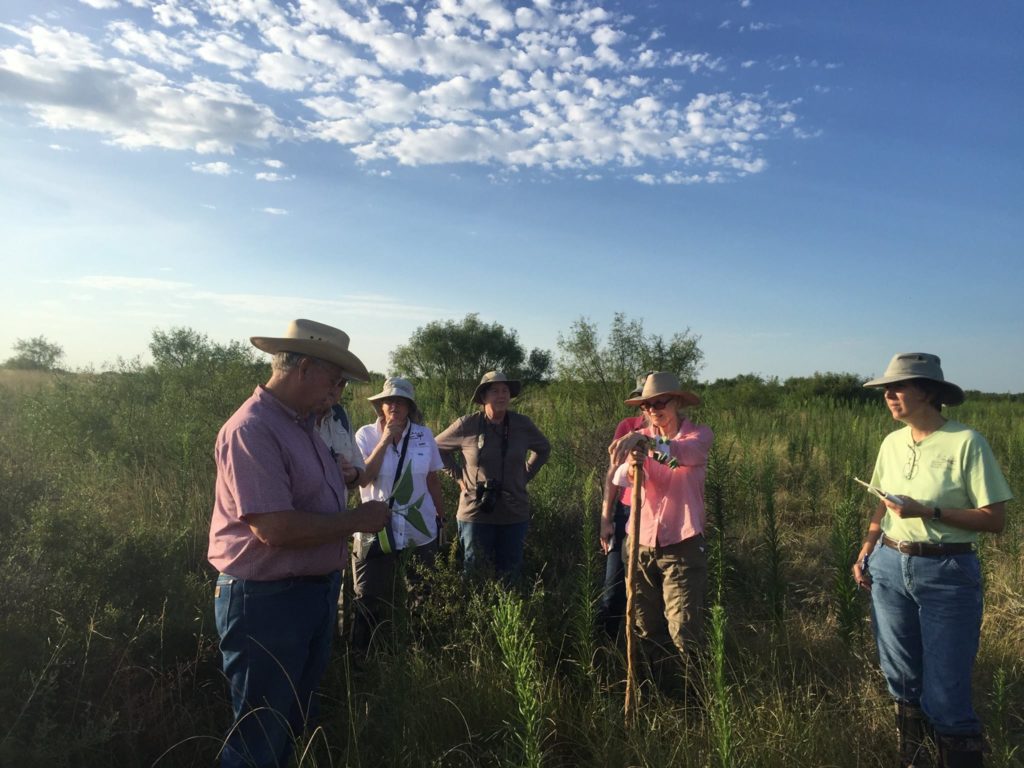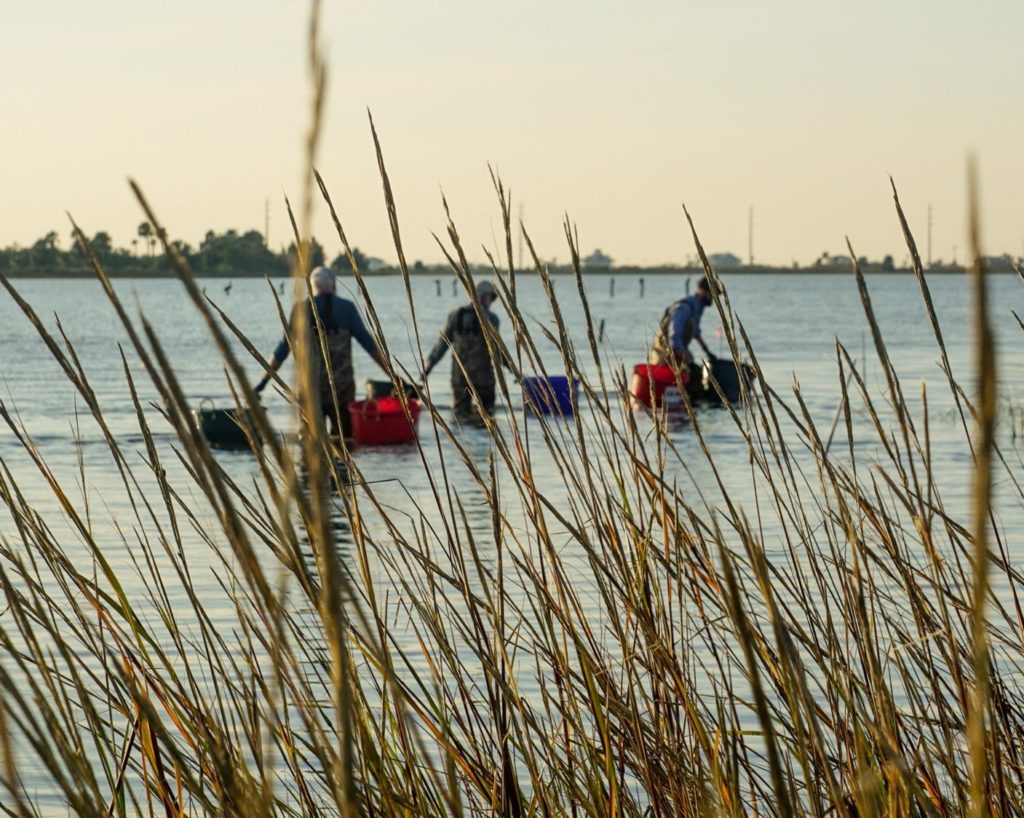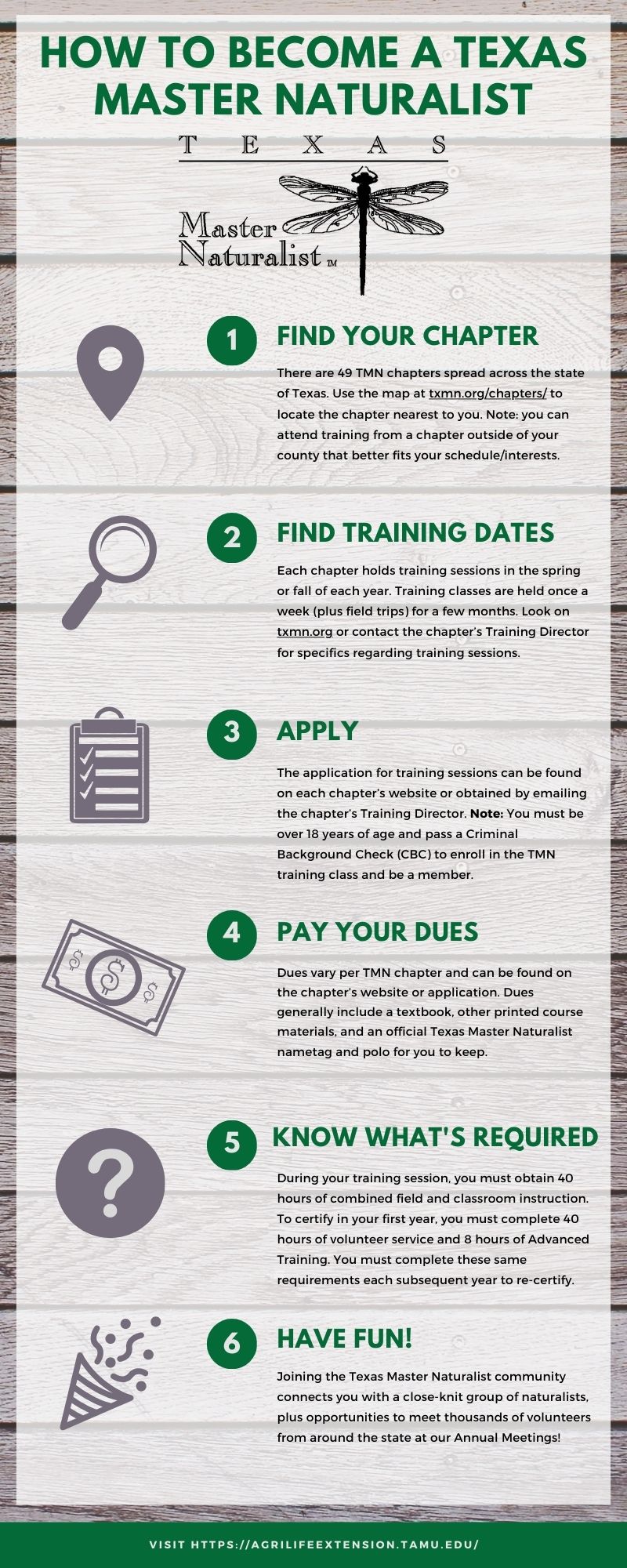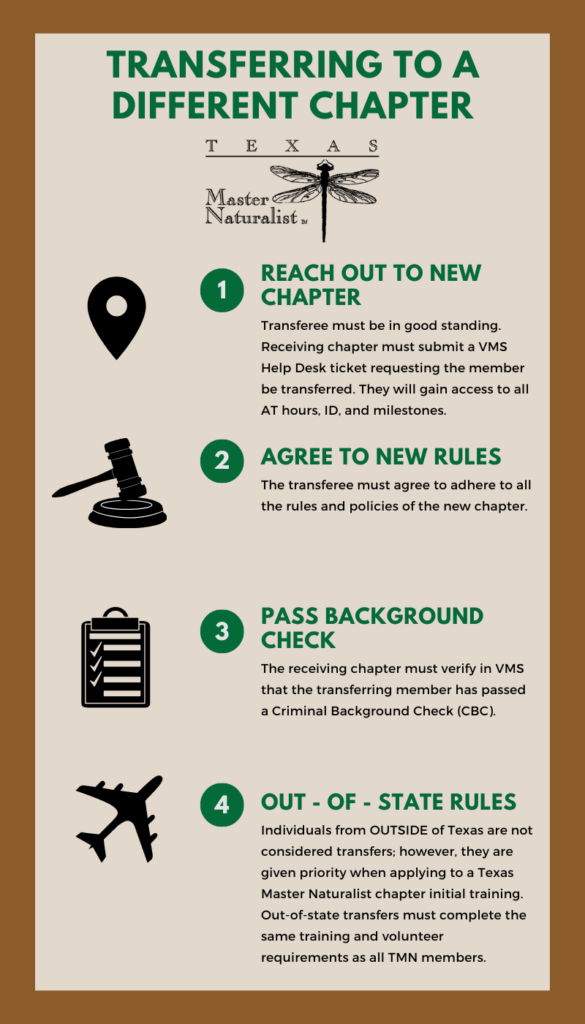Click here to view all Chapters hosting 2024 basic training classes.
Why Join the Master Naturalist Program?


The mission of the Texas Master Naturalist Program is to develop a corps of well-informed volunteers to provide education, outreach, and service dedicated to the beneficial management of natural resources and natural areas within their communities for the State of Texas. There are numerous reasons why becoming a Master Naturalist is a good idea.
1. Local Knowledge
The Texas Master Naturalist program covers a range of topics relatable across the state. However, local knowledge is stressed through the selection of local experts to instruct sections of the course. Most of the course sections have a lecture and field lab component, so participants learn about and experience the local ecosystems firsthand. The vast majority of participants learn interesting facts about ecosystems in their backyard and share that information with many other people.
2. Environmental Outreach
Through the Master Naturalist training, participants not only learn about natural resources, but they also receive training on how to educate others about natural resources. A primary goal of the Master Naturalist program is to develop an organization of knowledgeable volunteers to help promote conservation and management of natural resources through educating their communities.
3. Continuous Learning
The Master Naturalist program and partners offer many advanced training opportunities throughout the year. These opportunities serve as more focused trainings on many aspects of the basic course or cover topics not included in the basic training. Thereby, continually increasing the participant’s knowledge.
4. Networking and Connecting
The selected instructors and program partners are well respected individuals and entities in the environmental field. Through the Master Naturalist program, participants get to meet, mingle, learn from and pick the brains of these environmental leaders. Often, the Master Naturalist participants connect with one or more of the program partners for opportunities outside of the program.
5. Giving Back
In return for your training, you will provide your community with valuable service in the form of stewardship, education and outreach. Participation in this program and its associated certification often leads to participants being recognized as environmental experts and/or leaders in their communities.
What does it take to be a Texas Master Naturalist?
Texas Master Naturalists not only get their feet wet and their hands dirty, but while doing so, they spend time in a natural setting. Members learn about different plant and animal species, and maybe even find something new: one member, in fact, discovered a new plant species.
How to become a Texas Master Naturalist:
- Master Naturalist Trainees must successfully complete an approved training program with at least 40 hours of combined field and classroom instruction though a Texas Master Naturalist Chapter.
- While completing the training above, the candidate serves at least 40 hours of volunteer service in their community and engages in 8 hours of advanced training to advance their knowledge and connection with their ecoregion.
- In subsequent years, the candidate must complete another 8 hours of advanced training and donate 40 hours of volunteer service to maintain their certification (or to re-certify) as a Texas Master Naturalist.
Each of the items above must be completed through a Texas Master Naturalist Chapter.
How do I become a Texas Master Naturalist?
1. FIND YOUR CHAPTER
There are 49 TMN chapters spread across the state of Texas. Use the map at txmn.org/chapters/ to locate the chapter nearest to you. Note: you can attend training from a chapter outside of your county that better fits your schedule/interests.
2. FIND TRAINING DATES
Each chapter holds training sessions in the spring or fall of each year. Training classes are held once a week (plus field trips) for a few months. Look on txmn.org or contact the chapter’s Training Director for specifics regarding training sessions.
3. APPLY
The application for training sessions can be found on each chapter’s website or obtained by emailing the chapter’s Training Director. Note: You must be over 18 years of age and pass a Criminal Background Check (CBC) to enroll in the TMN training class and be a member.
4. PAY YOUR DUES
Dues vary per TMN chapter and can be found on the chapter’s website or application. Dues generally include a textbook, other printed course materials, and an official Texas Master Naturalist nametag and polo for you to keep.
5. KNOW WHAT’S REQUIRED
During your training session, you must obtain 40 hours of combined field and classroom instruction. To certify in your first year, you must complete 40 hours of volunteer service and 8 hours of Advanced Training. You must complete these same requirements each subsequent year to re-certify.
6. HAVE FUN!
Joining the Texas Master Naturalist community connects you with a close-knit group of naturalists, plus opportunities to meet thousands of volunteers from around the state at our Annual Meetings!
How do I transfer to a new chapter?
1. REACH OUT TO A NEW CHAPTER
Transferee must be in good standing. Receiving chapter must submit a VMS Help Desk ticket requesting the member be transferred. They will gain access to all AT hours, ID, and milestones.
2. AGREE TO NEW RULES
The transferee must agree to adhere to all the rules and policies of the new chapter.
3. PASS BACKGROUND CHECK
The receiving chapter must verify in VMS that the transferring member has passed a Criminal Background Check (CBC).
4. OUT – OF – STATE RULES
Individuals from OUTSIDE of Texas are not considered transfers; however, they are given priority when applying to a Texas Master Naturalist chapter initial training. Out-of-state transfers must complete the same training and volunteer requirements as all TMN members.
Who can join the Texas Master Naturalists?
Anyone who lives in Texas and is over the age of 18 can apply!
Find a Texas Master Naturalist Chapter Near You
Click here to see the map of current chapters. Click on the chapter serving your county or the county nearest you to be directed to that chapter’s website.
Have additional questions?
Visit our Frequently Asked Questions page.




